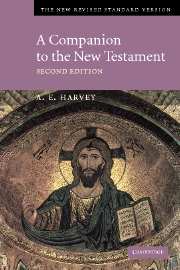Book contents
- Frontmatter
- Contents
- Preface
- Preface to the First Edition (1970)
- THE NEW TESTAMENT
- THE GOSPELS
- THE ACTS OF THE APOSTLES
- LETTERS
- Romans
- 1 Corinthians
- 2 Corinthians
- Galatians
- Ephesians
- Philippians
- Colossians
- 1 Thessalonians
- 2 Thessalonians
- 1 Timothy
- 2 Timothy
- Titus
- Philemon
- Hebrews
- James
- 1 Peter
- 2 Peter
- 1 John
- 2 John
- 3 John
- Jude
- THE REVELATION
- Old Testament References
- Index
- Frontmatter
- Contents
- Preface
- Preface to the First Edition (1970)
- THE NEW TESTAMENT
- THE GOSPELS
- THE ACTS OF THE APOSTLES
- LETTERS
- Romans
- 1 Corinthians
- 2 Corinthians
- Galatians
- Ephesians
- Philippians
- Colossians
- 1 Thessalonians
- 2 Thessalonians
- 1 Timothy
- 2 Timothy
- Titus
- Philemon
- Hebrews
- James
- 1 Peter
- 2 Peter
- 1 John
- 2 John
- 3 John
- Jude
- THE REVELATION
- Old Testament References
- Index
Summary
The events surrounding Paul's first visit to Philippi are dramatically told in Acts 16 and are also referred to by Paul (with some indignation) in 1 Thessalonians 2.2. Despite this violent beginning the Philippian church had evidently taken root and flourished; and although Paul was able to make it only one, or possibly two, subsequent visits (Acts 20.1–7; 2 Corinthians 2.13), it more than once provided him with generous financial support, and its record of faith and loyalty is apparent from this, the warmest and most affectionate of Paul's surviving letters.
The city of Philippi was the first on the Egnatian Way leading from Asia to the Adriatic (see the map on p. 449). It was not large, but had received the distinction of being re-founded by the emperor Augustus in 31 bce as a Roman colony, which meant that almost the entire upper class were Roman settlers, speaking Latin rather than Greek and enjoying a number of civic and financial privileges which made them enthusiastically loyal to Rome. Their culture and their religion dominated the city, even though it contained a substantial population of indigenous Greek-speaking inhabitants as well as a very small Jewish community – too small, certainly, to have built itself a synagogue (Acts 16.13), but possibly large enough to have exerted some pressure on the Christians.
- Type
- Chapter
- Information
- A Companion to the New Testament , pp. 625 - 636Publisher: Cambridge University PressPrint publication year: 2004



